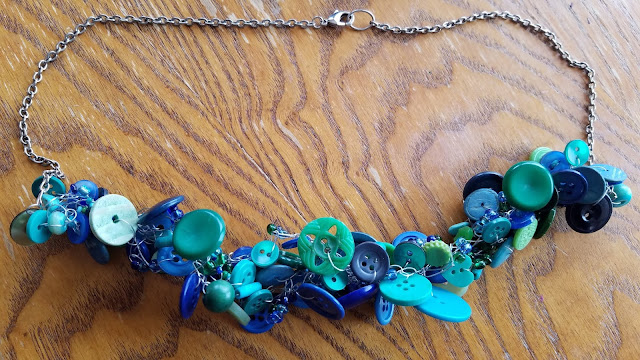Don't Do This With Your Buttons
reposted from BethLeintz.typepad.com
An antique dealer once told me that since most dealers don't go to school to learn the "trade", we get our education from our mistakes. Usually those are mistakes in what we buy. Even though I've been doing this for 15 years, I still make mistakes. I guess that means I'm still learning.
At
an estate sale last weekend, I saw buttons, lots of buttons, buttons on
cards. Buttons in a bag or a jar will make my heart beat a little
faster.
Buttons
that have been put on cards by other collectors make my heart skip a
beat. They're special, because someone went to the trouble to collect
them, lay them out, attach them to cards.
When
I saw this button card at an estate sale, I was overcome with button
lust and I bought the card without really considering my purchase.
My first mistake was assuming these were glass buttons. They LOOK like glass, but I think they're all plastic. Worse than that, they had been attached to the board with wire- METAL wire.
Metal
and plastic, especially old plastic, do not mix well. The metal in the
wire causes the plastic to deteriorate and crumble.
When I tried to take this button off the card....
There were plenty of clues that this wasn't a great purchase:
- Many missing buttons.
- The wire holding the buttons to the card was green colored from corrosion.
- It's pretty easy to tell the difference between glass and plastic. Glass will feel cold when you hold it next to your cheek.
At the same sale, I bought another card of buttons, all "V" for Victory buttons from the WWII era.
These buttons have some condition issues, too; but I really like keepsakes from WWII homefront era .
These buttons had been attached with wire, too; but I very carefully took them off. A few crumbled, but these were keepers.
Lessons
learned- don't buy in haste, make sure you can live with the condition
of whatever you're buying and don't mix metal buttons (or wire) with
plastic.



Comments
they sure are pretty though!
what do you suggest to attach with besides just thread and needle? thanks
It is mainly Celluloid combined with metal that will decompose if not not properly stored: dry conditions, no extreme temperature changes and left open to air exchange. Otherwise the combined chemicals will let off a gas and cause decomposition.
A good way to secure buttons is with plastic-covered telephone wire. Just make sure no metal wire is exposed when securing the button.
tam@ spinstersnacks.com
Blessings,
Susan
Thanks for sharing.
Diane
The Library Lady
Your button experience is very informatiive.
But wait! One button looked pristine. It was a silver rooster button, shown in Big Book of Buttons its value $100. I do love that button. Rose Sullivan